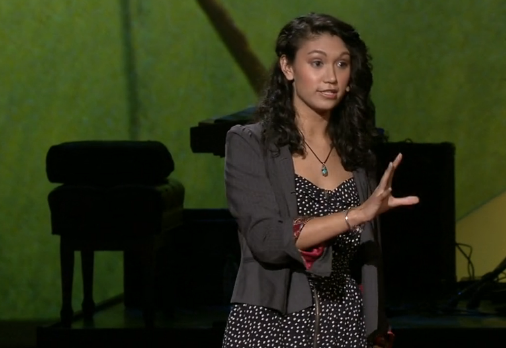Now I can divide my spoken-word journey into three steps. Step one was the moment I said, "I can. I can do this."
現在我可以把我口語詩經歷分為三階段。第一階段那時我會說,“我能,我能做到這個。”
And that was thanks to a girl in a hoodie. Step two was the moment I said, "I will. I will continue.
這要感謝那個連帽衫的女孩。第二階段時我說,“我會,我會繼續。
I love spoken word. I will keep coming back week after week."
我愛上口語詩。我會每周回來表演。”
And step three began when I realized I didn't have to write indignant poems, if that's not what I was.
第三階段開始時,我意識到我不必寫些憤青的詩,如果這表達的不是真的我。
There were things that were specific to me, and the more that I focused on those things, the weirder my poetry got, but the more that it felt like mine.
有些事對我來說是很獨特的,我更關注這些事,我的詩歌就更離奇怪誕,但這也更像是我自己。

It's not just the adage "Write what you know."
這不只是一句格言“寫你所知的,”
It's about gathering up all of the knowledge and experience you've collected up to now to help you dive into the things you don't know.
而這是有關集合所有知識和體驗,到現在你已收集到的一切來幫助你深入了解你所不知道的東西。
I use poetry to help me work through what I don't understand, but I show up to each new poem with a backpack full of everywhere else that I've been.
我用詩歌幫助我經歷我所不理解的事,但我展示每一首新詩,它是用我已去過其他地方的一打故事來寫的。
When I got to university, I met a fellow poet who shared my belief in the magic of spoken-word poetry.
我在大學時,我遇見同校詩人,他和我堅信口語詩的神奇。
And actually, Phil Kaye and I coincidentally also share the same last name.
而且,我和菲爾·凱巧合也同姓。
When I was in high school I had created Project V.O.I.C.E. as a way to encourage my friends to do spoken word with me.
在高中我已創建V.O.I.C.E.計劃,它是鼓勵我的朋友和我一起創作口語詩的一種方式。
But Phil and I decided to reinvent Project V.O.I.C.E., this time changing the mission to using spoken-word poetry as a way to entertain, educate and inspire.
但我和菲爾決定徹底改造V.O.I.C.E.計劃--這次改變它的使命為:用口語詩作為一種娛樂,教育和激勵的方式。
We stayed full-time students, but in between we traveled, performing and teaching nine-year-olds to MFA candidates,
我們還是全日制學生,但中間我們旅行,表演和傳授給9歲到美術碩士的任何申請人,
from California to Indiana to India to a public high school just up the street from campus.
他們來自從加州到印地安那州,到印度,到公立高中,到校園剛剛注冊的街角等。











